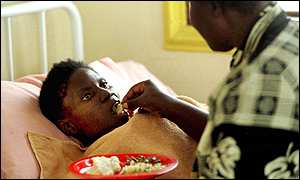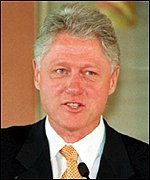
The World Health Organisation is, of course,
overjoyed |
|
WHO boss David Nabarro
|
"Given the devastating impact of Aids, the US will not require or negotiate restrictive rules in the intellectual property rights area," US Trade Representative Charlene Barshefsky said.
American officials will no longer automatically seek to stop African countries from licensing or developing generic forms of drugs patented by American pharmaceutical companies.
 The US Government has declared Aids a
threat to national
security |
"We've been calling for reductions in the costs of these drugs so that it's going to be possible to build up health care for people with HIV and Aids throughout the world," he added.
Balance
The new policy is aimed at balancing the needs of African nations with the need to safeguard the basic rights of companies to protect their products.
Weakening intellectual property rights is not the
solution |
|
American drugs manufacturers president Alan
Holmer |
They argue that giving permission to local drug manufacturers in Africa to make generic copies of Aids-fighting drugs violated patent regulations and could damage future research.
"We recognise that Aids is a major problem, but weakening intellectual property rights is not the solution," said Alan Holmer, president of the Pharmaceutical Research and Manufacturers of America.
 Aids is creating many orphans in
sub-Saharan
Africa |
"The president should be applauded for his leadership in recognising the severity of the crisis," said Eric Sawyer, a New York-based activist.
The agreement extends an accord signed last September with South Africa to the whole of sub-Saharan Africa.
Washington has been under great pressure from activists, who argued that desperately-needed drugs which can delay the onset of the disease were being denied to the poorest countries.
The move follows a recent American declaration that Aids was a national security threat to the US.
| Search BBC News
Online | ||
Advanced search options | ||
The BBC is not responsible for the content of external internet sites
